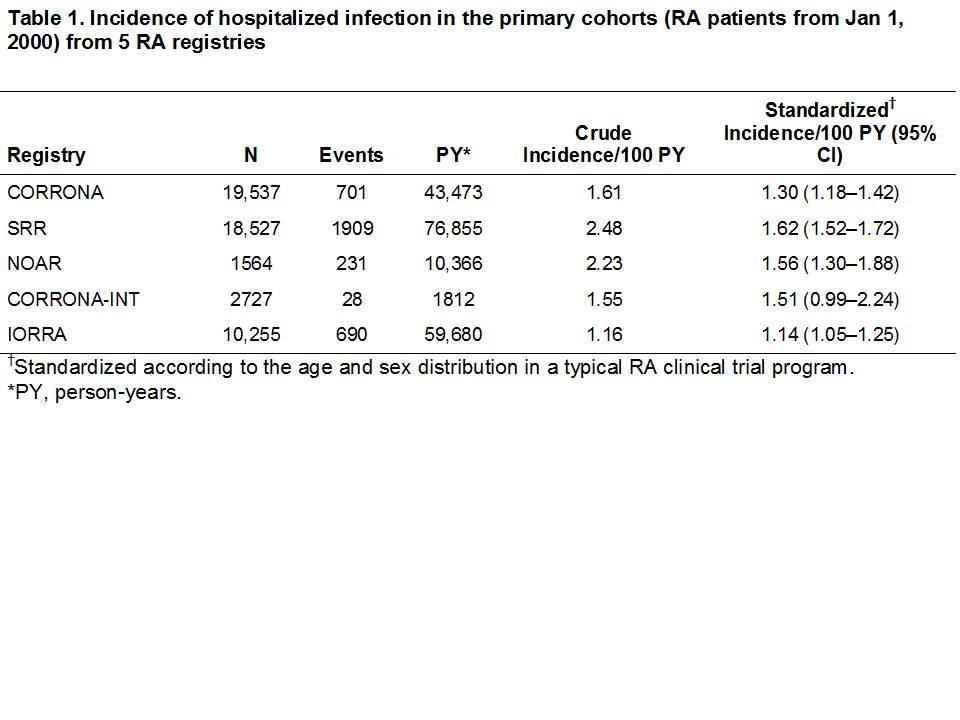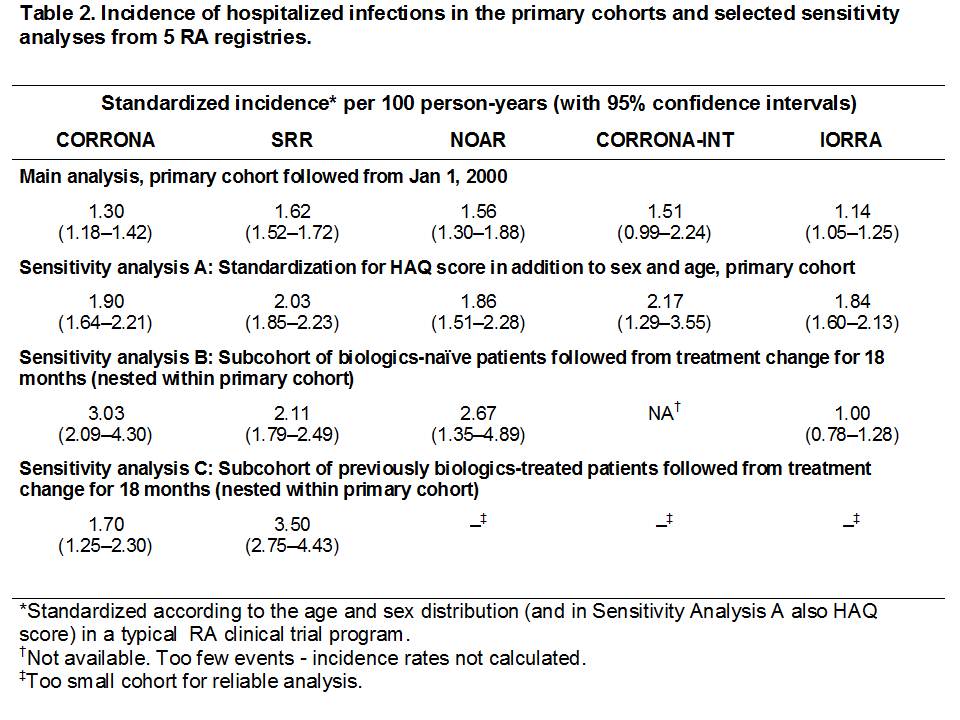Session Information
Session Type: Abstract Submissions (ACR)
Background/Purpose: Rheumatoid arthritis (RA) patients are at increased risk of infection due to both RA itself and immunomodulating treatments. Infection rates are often difficult to compare across studies, since the rates may vary across the world, and due to methodological and demographic differences between studied populations or cohorts. We investigated rates of hospitalized infection in 5 RA registries from 4 continents, employing a standard set of analyses and standardizing rates to a common population.
Methods: Participating registries were CORRONA (USA), SRR (Sweden), NOAR (UK), CORRONA International (East Europe, Latin America, India) and IORRA (Japan). The definition of hospitalized infections was harmonized as much as possible across registries. Within each registry, we analyzed a primary cohort of all RA patients from January 2000 to last available data of each registry (2010-2013), and several subcohorts for sensitivity analyses, defined by disease activity, treatment status, calendar time, duration of follow-up and prior comorbidity. Rates were standardized for age, sex and, in 1 sensitivity analysis, also for HAQ, using the distributions from a typical RA trial program population.
Results: There was relatively high consistency in rates across registries, and sex/age standardization increased consistency further (Table 1). Generally, the primary cohorts provided the lowest or close to lowest rate (Table 2). In most registries, the highest rates were seen in subcohorts (either biologic naïve or with prior biologic treatment) with only 18 months follow-up after treatment change (Table 2). Additional standardization for HAQ score according to a trial patient distribution led to increased rates in all registries (Table 2).
Conclusion: This study constitutes the first attempt to compare the incidence of hospitalized infections internationally using existing RA cohorts. Consistent methodology, outcome definitions and analysis with standardization of rates facilitated comparison across registries. In most registries there is evidence of higher infection rates initially after starting treatment. The main analysis may be a good averaged estimate of risk over the longer term but may underestimate short-term risk. HAQ standardization appears useful to further address potential bias due to differences between registries and a typical trial population. Remaining differences between registries may reflect true regional differences in risk factors, populations and health care, although residual population and methodological differences are possible.
Disclosure:
H. Yamanaka,
AstraZeneca, Abbott, AbbVie, Chugai, Takeda, Pfizer, Daiichi Sankyo, Mitsubishi Tanabe, Teijin, Nippon Kayaku, Taishotoyama, Bristol-Myers Squibb, Astellas, Eisai, MSD, Santen, GlaxoSmithKline, Asahikasei, Janssen,
2,
AstraZeneca, Abbott, AbbVie, Chugai, Takeda, Pfizer, Daiichi Sankyo, Mitsubishi Tanabe, Teijin, Nippon Kayaku, Bristol-Myers Squibb, Astellas, Eisai,
5,
Abbott, AbbVie, Chugai, Takeda, Pfizer, Mitsubishi Tanabe, Teijin, Bristol-Myers Squibb, Astellas, Eisai,
8;
J. Askling,
AstraZeneca,
2,
AstraZeneca,
5;
N. Berglind,
AstraZeneca, Bristol-Myers Squibb,
1,
AstraZeneca,
3;
S. Franzén,
AstraZeneca,
1,
AstraZeneca,
3;
T. Frisell,
None;
C. Garwood,
None;
J. D. Greenberg,
AstraZeneca, CORRONA, Pfizer,
5,
CorRRONA,
1;
M. Ho,
AstraZeneca,
3;
M. Holmqvist,
None;
L. Horne,
AstraZeneca,
1,
AstraZeneca,
3;
E. Inoue,
None;
K. Lampl,
AstraZeneca,
1,
AstraZeneca,
3;
K. Michaud,
University of Nebraska Medical Center and the National Data Bank for Rheumatic Diseases,
3;
D. A. Pappas,
Corrona,
3,
Novartis Pharmaceutical Corporation,
5,
Adjunct assistant professor at Columbia University,
6;
G. Reed,
Corrona,
3;
D. Symmons,
AstraZeneca,
2,
AstraZeneca,
5;
E. Tanaka,
None;
T. Tran,
Medimmune LLC,
3;
S. Verstappen,
None;
F. Nyberg,
AstraZeneca,
3,
AstraZeneca,
1.
« Back to 2013 ACR/ARHP Annual Meeting
ACR Meeting Abstracts - https://acrabstracts.org/abstract/rates-of-hospitalized-infections-in-rheumatoid-arthritis-patients-from-5-rheumatoid-arthritis-registries-across-the-world/


